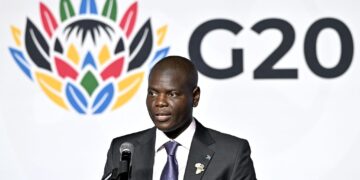South Africa has formally declared its intention to explore a bid for hosting the Olympic and Paralympic Games in either 2036 or 2040, in what would mark a historic first for the African continent. The announcement was delivered by Minister in the Presidency Khumbudzo Ntshavheni during a media engagement at Parliament in Cape Town on 13 November 2025.
Ntshavheni confirmed that the Cabinet has granted approval for the country to enter into ongoing dialogue with the International Olympic Committee, describing the discussions as “preliminary and exploratory.” These engagements, she explained, are aimed at laying the groundwork for a possible formal bid, and are considered essential to articulate South Africa’s strategic vision for hosting one of the world’s most prestigious sporting events.
While South Africa’s interest in hosting the Olympic Games has previously been indicated, this declaration represents the most structured initiative since Cape Town’s unsuccessful bid for the 2004 Games, which were awarded to Athens. The renewed initiative is presented as part of a broader Pan African aspiration to secure a place on the global sporting calendar, countering longstanding continental exclusion from Olympic hosting responsibilities.
To date, no African nation has hosted the Olympic Games. In 2023, Egypt was the first African country to express formal interest in hosting the 2036 edition. South Africa’s declaration therefore signals a growing continental momentum, reflective of a broader push towards representation and global participation grounded in infrastructure readiness, diplomatic maturity and an evolving African sports economy.
The South African Cabinet underscored its confidence in the country’s infrastructural capacity, drawing from the legacy of major global sporting events previously hosted, including the 1995 Rugby World Cup, the 2003 ICC Cricket World Cup, and the 2010 FIFA World Cup. These events have established South Africa’s reputation for delivering large-scale, complex tournaments with regional and international resonance.
Minister Ntshavheni emphasised that the Olympic bid is not merely a national aspiration, but one grounded in a Pan African vision of inclusion, equity and excellence. In this context, the dialogue with the IOC offers an opportunity to reframe global perceptions about Africa’s capabilities, infrastructure, and its right to participate as an equal stakeholder in the international sports ecosystem.
Notably, the approach to the bid reflects a more collaborative, strategic positioning, rejecting linear or paternalistic narratives that have often coloured discourse about Africa’s place in global affairs. Rather than viewing the bid through a lens of developmental need, South Africa’s exploratory engagement with the IOC is framed as a contribution to the reshaping of global norms and the democratisation of access to international platforms.
At present, no formal bid has been submitted. The IOC’s “Future Host Commission” facilitates ongoing dialogue with potential host countries well in advance of official bid processes. The process has been revised to be more transparent and collaborative, enabling nations to engage in long-term planning without the high financial and political costs of traditional bidding competitions.
As the conversation unfolds, it will not only test South Africa’s diplomatic and technical readiness but also the IOC’s stated commitment to universality and regional inclusion. The question of whether Africa will finally host the Olympic Games remains open, but the significance of this moment extends beyond timelines or venues. It is a reflection of a continent increasingly asserting its voice in spaces where it has long been underrepresented.
This initiative may well redefine the narrative surrounding African participation in global sports and provide a case study in how infrastructure, history, and aspiration can intersect to create opportunities that are both symbolic and material for future generations across the continent.















